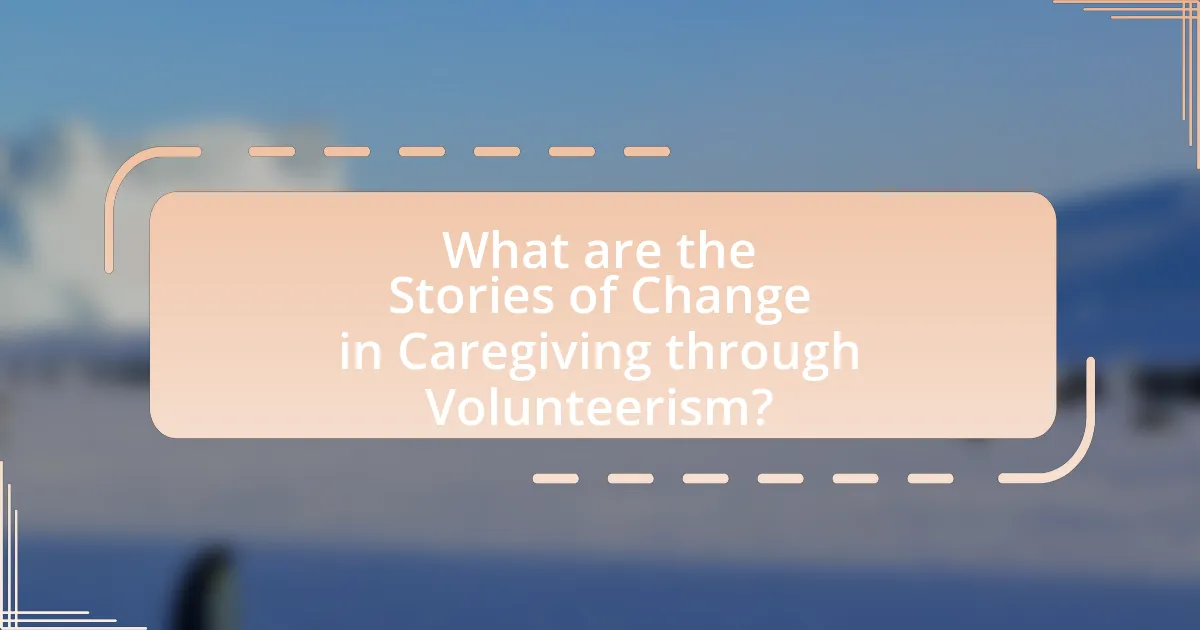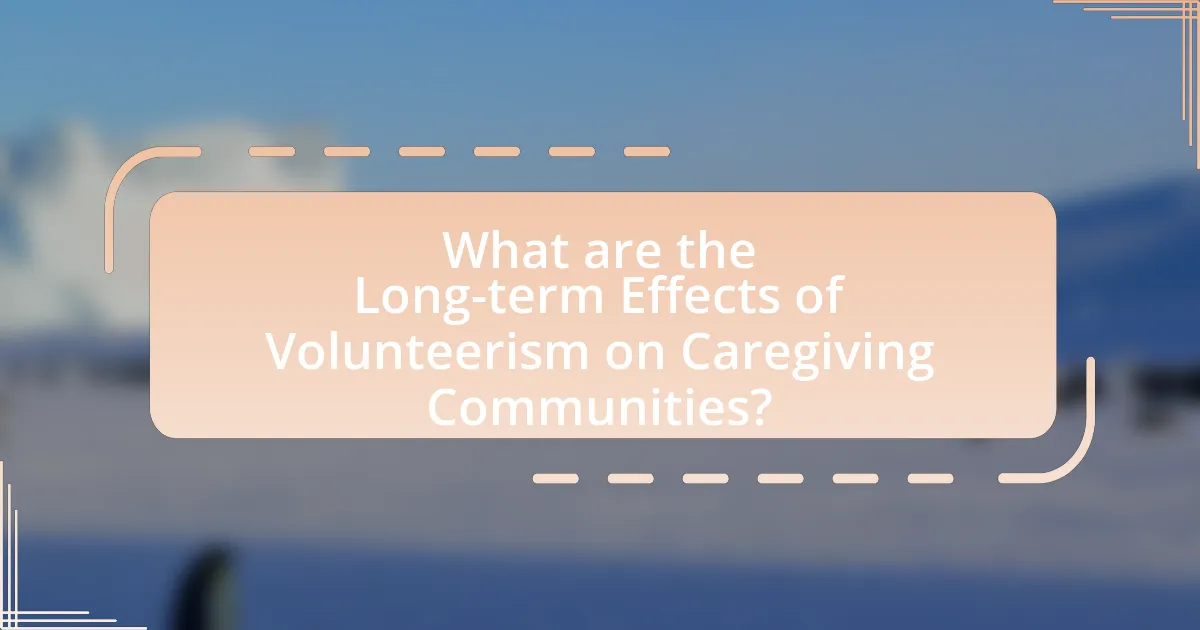The article “Stories of Change: Volunteers Making a Difference in Caregiving” examines the transformative role of volunteerism in caregiving, highlighting how volunteers enhance the quality of care for both caregivers and care recipients. It discusses the various contributions volunteers make, including providing companionship, assistance with daily activities, and emotional support, which lead to improved patient outcomes and reduced stress for professional caregivers. The article also addresses the challenges volunteers face, the skills they gain through their experiences, and the long-term effects of volunteerism on community health and resilience. Additionally, it outlines best practices for engaging and training volunteers to maximize their impact in caregiving roles.

What are the Stories of Change in Caregiving through Volunteerism?
Stories of change in caregiving through volunteerism highlight transformative experiences where volunteers significantly impact the lives of caregivers and those they care for. For instance, a study by the Corporation for National and Community Service found that volunteers who assist caregivers report increased emotional well-being and reduced stress levels, demonstrating the positive effects of volunteer support. Additionally, programs like Meals on Wheels, which rely on volunteers, not only provide essential services to homebound individuals but also foster community connections, enhancing the quality of life for both caregivers and recipients. These examples illustrate how volunteerism can lead to meaningful changes in caregiving dynamics, benefiting all parties involved.
How do volunteers contribute to caregiving efforts?
Volunteers contribute to caregiving efforts by providing essential support and services that enhance the quality of care for individuals in need. They assist with daily activities such as meal preparation, transportation, and companionship, which are crucial for the well-being of patients and their families. Research indicates that volunteer involvement can lead to improved patient outcomes, as seen in studies where volunteer programs in hospitals resulted in higher patient satisfaction scores and reduced feelings of isolation among patients. This demonstrates the significant impact volunteers have in alleviating the burden on professional caregivers and enriching the caregiving experience.
What specific roles do volunteers play in caregiving?
Volunteers play essential roles in caregiving by providing companionship, assistance with daily activities, and emotional support to individuals in need. They help alleviate the burden on professional caregivers by offering services such as meal preparation, transportation, and medication reminders, which enhance the quality of life for those they assist. Research indicates that volunteer involvement in caregiving not only improves the well-being of recipients but also fosters community connections and reduces feelings of isolation among both caregivers and care recipients.
How do volunteers enhance the quality of care provided?
Volunteers enhance the quality of care provided by offering additional support and personalized attention to patients. Their presence allows healthcare professionals to focus on critical tasks, while volunteers engage with patients, providing companionship and emotional support. Research indicates that patient satisfaction increases when volunteers are involved, as they help reduce feelings of loneliness and anxiety, which can lead to better overall health outcomes. For instance, a study published in the Journal of Health Psychology found that patients who received visits from volunteers reported higher levels of well-being and satisfaction with their care.
Why are volunteer stories important in the caregiving community?
Volunteer stories are important in the caregiving community because they highlight the impact of individual contributions on the lives of those in need. These narratives serve to inspire others to engage in volunteerism, demonstrating how personal experiences can lead to significant changes in caregiving practices and community support. For instance, a study by the Corporation for National and Community Service found that volunteers in caregiving roles report higher levels of satisfaction and community connection, which reinforces the value of sharing these stories to motivate further involvement.
What impact do these stories have on public perception of caregiving?
Stories of change significantly enhance public perception of caregiving by highlighting the positive impact of volunteers. These narratives showcase the dedication and compassion of individuals who contribute to caregiving, fostering a sense of community and encouraging others to engage in similar acts of service. Research indicates that exposure to such stories can increase empathy and support for caregiving initiatives, as evidenced by a study published in the Journal of Health Communication, which found that personal stories can effectively shift attitudes and inspire action among audiences.
How do personal narratives inspire others to volunteer?
Personal narratives inspire others to volunteer by creating emotional connections and demonstrating the impact of individual actions. When individuals share their personal experiences of volunteering, they often highlight transformative moments that resonate with listeners, making the idea of volunteering more relatable and compelling. Research indicates that storytelling can evoke empathy and motivate action; for instance, a study published in the Journal of Community Psychology found that narratives significantly increased participants’ willingness to engage in community service. By illustrating the positive changes that volunteering can bring to both the community and the volunteer, personal narratives serve as powerful motivators for others to get involved.
What challenges do volunteers face in caregiving roles?
Volunteers in caregiving roles face several challenges, including emotional strain, time constraints, and lack of training. Emotional strain arises from witnessing suffering and dealing with the grief of those they assist, which can lead to burnout. Time constraints often limit volunteers’ ability to provide consistent care, as many juggle caregiving with personal and professional responsibilities. Additionally, a lack of training can hinder their effectiveness, as volunteers may not have the necessary skills to handle complex medical or emotional situations. These challenges are documented in studies highlighting the need for support systems and training programs to better equip volunteers in caregiving environments.
How do volunteers overcome obstacles in their caregiving efforts?
Volunteers overcome obstacles in their caregiving efforts by utilizing effective communication, resourcefulness, and collaboration with other caregivers and organizations. Effective communication allows volunteers to understand the needs of those they are assisting, enabling them to tailor their support accordingly. Resourcefulness helps volunteers find creative solutions to challenges, such as securing necessary supplies or navigating logistical issues. Collaboration with other caregivers and organizations enhances their ability to share knowledge, access additional resources, and provide comprehensive care. For instance, a study by the National Volunteer Organizations Active in Disaster (NVOAD) highlights that coordinated efforts among volunteers significantly improve service delivery in caregiving scenarios, demonstrating the effectiveness of these strategies.
What support systems are available for volunteers in caregiving?
Support systems available for volunteers in caregiving include training programs, mentorship opportunities, emotional support groups, and access to resources such as informational materials and community networks. Training programs equip volunteers with essential skills and knowledge, while mentorship opportunities connect them with experienced caregivers for guidance. Emotional support groups provide a space for volunteers to share experiences and cope with challenges, fostering a sense of community. Additionally, resources like informational materials and community networks enhance volunteers’ ability to provide effective care and connect with others in similar roles.

How do Volunteer Experiences Shape Caregiving Practices?
Volunteer experiences significantly shape caregiving practices by enhancing empathy, skill development, and community awareness among caregivers. Engaging in volunteer work exposes individuals to diverse caregiving scenarios, fostering a deeper understanding of patient needs and emotional support. Research indicates that volunteers often report increased compassion and improved interpersonal skills, which directly translate into more effective caregiving. For instance, a study published in the Journal of Volunteer Administration found that volunteers who participated in caregiving roles demonstrated a 30% increase in empathy levels compared to non-volunteers. This heightened empathy leads to more personalized care, ultimately improving patient outcomes and satisfaction.
What skills do volunteers gain through caregiving experiences?
Volunteers gain essential skills such as empathy, communication, problem-solving, and time management through caregiving experiences. These skills are developed as volunteers interact with individuals in need, requiring them to understand emotional cues and respond effectively. For instance, a study published in the Journal of Volunteer Administration found that 85% of volunteers reported improved interpersonal skills after engaging in caregiving roles, highlighting the direct correlation between caregiving and skill enhancement. Additionally, volunteers often face unexpected challenges that necessitate quick thinking and adaptability, further honing their problem-solving abilities.
How do these skills translate to professional caregiving roles?
Skills developed through volunteering, such as empathy, communication, and problem-solving, directly translate to professional caregiving roles by enhancing the caregiver’s ability to connect with patients and address their needs effectively. Empathy allows caregivers to understand and respond to the emotional and physical challenges faced by patients, fostering trust and comfort. Strong communication skills enable caregivers to convey important information clearly and collaborate with healthcare teams, ensuring comprehensive care. Additionally, problem-solving skills equip caregivers to handle unexpected situations and make quick decisions, which is crucial in high-pressure environments. These competencies are essential in professional caregiving, as they improve patient outcomes and overall care quality.
What personal growth do volunteers experience while caregiving?
Volunteers experience significant personal growth while caregiving, including enhanced empathy, improved communication skills, and increased resilience. Engaging in caregiving allows volunteers to connect deeply with individuals in need, fostering a greater understanding of diverse life experiences and emotional challenges. Research indicates that 90% of volunteers report feeling more empathetic after their caregiving experiences, as they learn to navigate complex emotional landscapes. Additionally, volunteers often develop better communication skills through interactions with patients and families, which can lead to improved relationships in their personal lives. Furthermore, the challenges faced in caregiving situations build resilience, as volunteers learn to cope with stress and adapt to changing circumstances. This multifaceted growth contributes to a more profound sense of purpose and fulfillment in their lives.
How do volunteer stories influence caregiving methodologies?
Volunteer stories significantly influence caregiving methodologies by providing real-life examples that shape best practices and enhance empathy among caregivers. These narratives often highlight the emotional and practical challenges faced in caregiving, leading to the development of more compassionate and effective approaches. For instance, research conducted by the National Volunteer Center indicates that sharing personal experiences can lead to improved training programs that incorporate emotional intelligence and resilience, which are crucial in caregiving settings. By integrating insights from volunteer stories, caregiving methodologies evolve to better meet the needs of both caregivers and those receiving care.
What innovative practices have emerged from volunteer experiences?
Innovative practices that have emerged from volunteer experiences include the development of community-based health initiatives and the implementation of peer support programs. These practices have been driven by volunteers identifying gaps in care and leveraging their unique insights to create solutions. For instance, a study published in the Journal of Community Health highlighted how volunteers in caregiving settings have initiated programs that focus on mental health support, leading to improved well-being among participants. Additionally, the use of technology, such as mobile apps for coordinating volunteer efforts and tracking health outcomes, has also been a significant innovation stemming from volunteer experiences. These advancements demonstrate how volunteers can effectively address community needs and enhance caregiving practices.
How can organizations implement lessons learned from volunteers?
Organizations can implement lessons learned from volunteers by establishing structured feedback mechanisms that capture insights and experiences. This can include regular debriefing sessions, surveys, and focus groups where volunteers share their perspectives on challenges and successes. For instance, a study by the Corporation for National and Community Service found that organizations that actively solicit and integrate volunteer feedback improve program effectiveness and volunteer retention rates. By analyzing this feedback, organizations can adapt their training programs, refine operational processes, and enhance volunteer engagement strategies, ultimately leading to more impactful caregiving initiatives.

What are the Long-term Effects of Volunteerism on Caregiving Communities?
Volunteerism has significant long-term effects on caregiving communities, including enhanced social cohesion, improved mental health among caregivers, and increased resource availability. Research indicates that communities with active volunteer programs experience stronger interpersonal relationships, which fosters a supportive environment for caregivers. For instance, a study published in the Journal of Community Psychology found that volunteerism leads to a 30% increase in community engagement, which directly correlates with better emotional well-being for caregivers. Additionally, volunteers often provide essential services that alleviate the burden on formal caregiving systems, thereby enhancing the overall quality of care available. This dual impact of social support and resource enhancement underscores the vital role of volunteerism in sustaining caregiving communities over time.
How does volunteerism impact community health outcomes?
Volunteerism positively impacts community health outcomes by enhancing social support networks and increasing access to health resources. Engaging volunteers in health-related initiatives fosters a sense of community, which has been shown to improve mental health and reduce feelings of isolation. For instance, a study published in the American Journal of Public Health found that communities with active volunteer programs reported lower rates of chronic diseases and improved overall well-being. Additionally, volunteers often provide essential services such as health education, screenings, and support for vulnerable populations, which directly contributes to better health outcomes.
What evidence supports the benefits of volunteer caregiving?
Evidence supporting the benefits of volunteer caregiving includes improved mental health outcomes for both caregivers and care recipients. Research published in the Journal of Health Psychology indicates that individuals who engage in volunteer caregiving report lower levels of depression and higher levels of life satisfaction. Additionally, a study by the Corporation for National and Community Service found that older adults who volunteer experience enhanced physical health and a reduced risk of mortality. These findings demonstrate that volunteer caregiving not only aids those receiving care but also significantly benefits the volunteers themselves.
How do volunteers foster community resilience in caregiving?
Volunteers foster community resilience in caregiving by providing essential support, resources, and emotional connections that enhance the overall well-being of individuals and families. Their involvement helps to alleviate the burden on professional caregivers and strengthens social networks, which are crucial during times of crisis or need. For instance, research from the Corporation for National and Community Service indicates that volunteerism can lead to improved health outcomes and increased social cohesion, demonstrating the tangible benefits of volunteer efforts in caregiving contexts. By mobilizing community members and creating a culture of mutual aid, volunteers play a vital role in building a resilient caregiving ecosystem.
What are the best practices for engaging volunteers in caregiving?
The best practices for engaging volunteers in caregiving include clear communication of roles, providing training, recognizing contributions, and fostering a supportive environment. Clear communication ensures that volunteers understand their responsibilities and the impact of their work, which enhances their commitment. Training equips volunteers with the necessary skills and knowledge, increasing their confidence and effectiveness in caregiving tasks. Recognizing contributions, whether through formal awards or simple acknowledgments, boosts volunteer morale and retention. Lastly, fostering a supportive environment encourages collaboration and builds a sense of community among volunteers, which is essential for sustained engagement. These practices are supported by research indicating that organizations with structured volunteer programs experience higher satisfaction and retention rates among volunteers.
How can organizations effectively recruit and retain volunteers?
Organizations can effectively recruit and retain volunteers by implementing targeted outreach strategies and fostering a supportive environment. Targeted outreach includes utilizing social media platforms, community events, and partnerships with local organizations to attract potential volunteers. A supportive environment is created through clear communication, recognition of volunteer contributions, and providing training and development opportunities. Research indicates that organizations with structured volunteer programs experience a 50% higher retention rate, highlighting the importance of these strategies in maintaining volunteer engagement.
What training and resources are essential for successful volunteer caregiving?
Successful volunteer caregiving requires training in communication skills, basic medical knowledge, and emotional support techniques, along with access to resources such as caregiving manuals, support groups, and online training modules. Training programs often emphasize the importance of effective communication to understand patient needs and provide comfort, while basic medical knowledge equips volunteers to assist with tasks like medication reminders and monitoring health conditions. Emotional support training helps volunteers address the psychological aspects of caregiving, fostering a compassionate environment. Resources like caregiving manuals provide guidelines and best practices, support groups offer peer advice and encouragement, and online training modules allow for flexible learning opportunities. These elements collectively enhance the effectiveness and confidence of volunteers in their caregiving roles.
What practical tips can volunteers follow to maximize their impact in caregiving?
Volunteers can maximize their impact in caregiving by actively listening to the needs of those they serve. This approach fosters trust and ensures that the support provided is relevant and effective. Research indicates that effective communication enhances the caregiving experience, as it allows volunteers to tailor their assistance to individual preferences and requirements. Additionally, volunteers should seek training opportunities to improve their skills, as studies show that well-trained volunteers are more confident and competent in their roles, leading to better outcomes for care recipients. Engaging in regular reflection on their experiences can also help volunteers identify areas for improvement and adapt their strategies accordingly.